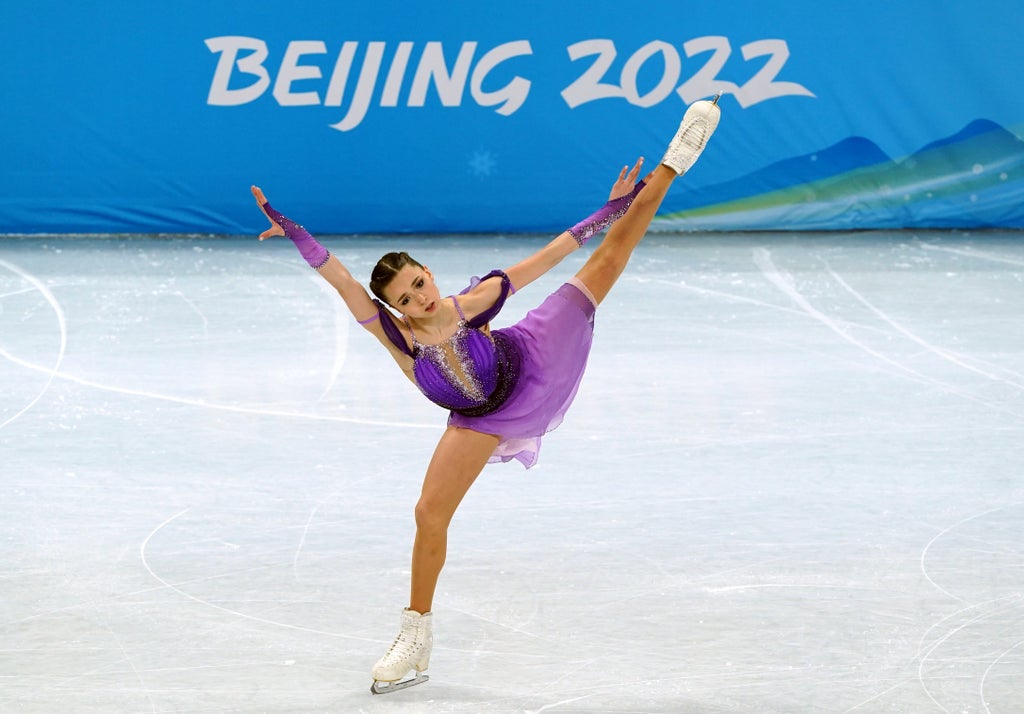
Russian figure skater Kamila Valieva, 15, has found herself at the centre of a doping scandal at the Winter Olympics in Beijing after testing positive for a banned substance.
The Russian Anti-Doping Agency (Rusada) was informed that Valieva, a rising star in her discipline nicknamed “Miss Perfect”, had failed a drug test on 8 February and moved quickly to issue a provisional suspension in accordance with World Anti-Doping Agency (Wada) regulations.
However, the skater appealed and the ban was lifted a day later, only for the International Olympic Committee, Wada and the International Skating Union to lodge an appeal of their own with the Court of Arbitration for Sport (Cas) asking for the suspension to be reimposed.
Cas subsequently ruled, having considered the lateness of the test result (six weeks after Valieva gave her sample and with the tournament already underway) and her age, that it would do “irreparable harm” if she were not allowed to participate, a verdict that has provoked an international outcry and is considered a slap in the face to other athletes, not least the American track sprinter Sha’Carri Richardson, who have been banned from competing at the highest level for an similar offences.
That outcome considered only the circumstances of the provisional ban, however, not the fact of the drug test being failed, which still needs to be addressed and could see Valieva demand that her secondary or “B” sample be tested in case the initial result was down to a laboratory error.
“These last few days have been very difficult for me,” Valieva herself told Russian broadcaster Channel One. “I’m happy to compete but I’m very tired emotionally.”
The drug at the centre of the controversy is trimetazidine (also known as TMZ), a heart medication that acts as a fatty acid oxidation inhibitor and is used to prevent and address the symptoms of angina or chest pains.
“It is believed to protect against myocardial ischaemia (reduced blood supply to the heart muscle) by increasing the rate at which glucose is broken down,” the European Medicines Agency explains.
“Trimetazidine is also used to treat the symptoms of vertigo (a spinning sensation) and tinnitus (ringing sensation in the ears), and to treat reduced vision and visual field disturbances (unclear or disturbed vision) due to problems affecting the blood vessels.”
TMZ could theoretically be beneficial to athletes by boosting the efficiency of the heart in delivering blood flow around the body, thereby improving physical stamina, however it is easily detected and would not be so advantageous for a competitor prepared to cheat as, for instance, growth hormones, steroids or amphetamines.
“I cannot imagine a figure skater taking this drug. It’s one big head scratcher. I can’t imagine a scenario where she would have taken it,” Dr Michael Joyner, a Mayo Clinic anesthesiologist and expert in human performance, told NBC News.
Chinese swimmer Sun Yang previously tested positive for the same substance in 2014 but turned out to have been prescribed it since 2008 by his doctor to treat heart palpitations and dizziness, prompting Wada to downgrade the drug’s status the following January from “stimulant” to “modulator of cardiac metabolism”, which still meant it was prohibited.
Russian bobsledder Nadezhda Sergeeva also tested positive for it at the PyeongChang Winter Olympics in South Korea in 2018, leading to her team’s eventual acceptance of an eight-month ban.
For now, Valieva is free to take to the ice representing the Russian Olympic Committee – her homeland still banned from competing in its own right until December as punishment for engaging in state-sponsored doping.
Her lawyers insist that she is innocent and may have simply taken some of her grandfather’s medication by mistake and she remains favourite to win her event, raising the possibility of further embarrassment for the Winter Olympics should she win a gold medal under a cloud of suspicion.







